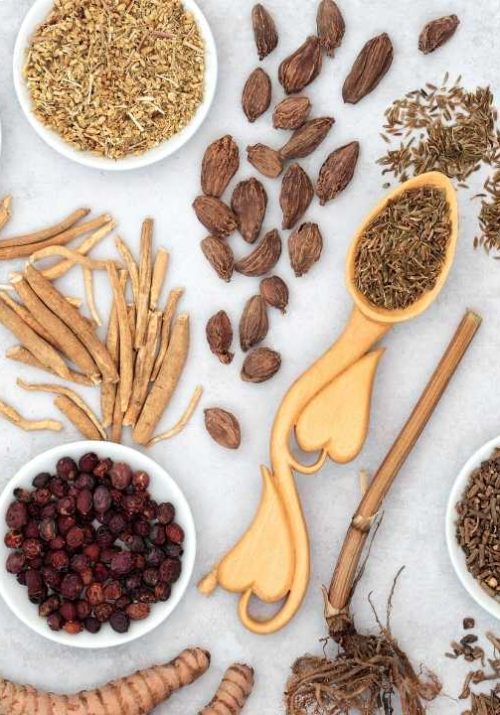Ready to tackle luteal phase symptoms with actionable luteal phase tips? Learn the luteal phase definition and how to feel your best during this time!

Are you among the many women who have intense luteal phase symptoms the week leading up to your period? If so, you’re not alone. Many women even agree that the luteal phase symptoms are worse than the actual period. The luteal phase, an essential part of the menstrual cycle, can bring about a range of symptoms that affect your daily life. In this blog post, we’ll explore what the luteal phase is, delve into the hormonal changes that lead to its symptoms, and provide actionable tips to help you beat luteal phase symptoms. We’ve got you covered whether you’re seeking relief from physical or emotional discomfort.
Luteal Phase Definition:
The luteal phase is the second half of the menstrual cycle, occurring after ovulation and leading up to menstruation. It is basically a fancy word for your PMS Week! This phase typically lasts around 10 to 16 days, with the average duration being 14 days. During this time, several hormonal and reproductive changes take place in your body.
Luteal Phase Hormonal Changes:
At the start of the luteal phase, which follows ovulation, the corpus luteum—a structure formed from the ruptured follicle after ovulation—begins to produce progesterone. This hormone plays a vital role in preparing the uterine lining for a potential pregnancy. However, if fertilization does not occur, the corpus luteum breaks down, causing a decline in progesterone levels. This hormonal shift ultimately triggers the shedding of the uterine lining, leading to menstruation. The fluctuations in hormone levels during this phase often result in the various symptoms associated with the luteal phase.
Common Luteal Phase Symptoms:
- Breast Tenderness: Many women experience breast tenderness during this phase. To alleviate discomfort, consider wearing a supportive bra and trying herbal remedies like Chasteberry or Evening Primrose Oil, known for their potential to reduce breast tenderness.
- Bloating: Abdominal bloating is a common complaint. Do gentle yoga with lots of twists and stay hydrated to help with bloating. Below is the BEST natural bloat supplement perfect for getting rid of the bloat that comes with the luteal phase and period. Formulated with peppermint and lemon balm it provides instant relief.
- Mood Swings: Hormonal fluctuations can lead to mood swings and irritability. Engaging in relaxation techniques like yoga or meditation may provide relief. Understanding that there is a reason you feel extra irritable and anxious at this time is the first step!
- Fatigue: Increased progesterone levels can cause fatigue. Ensure you’re getting adequate rest and sleep.
- Headaches: Some women report headaches. Stay hydrated and manage stress to reduce their frequency.
- Acne and Skin Issues: Hormonal changes may trigger skin problems. Maintain a consistent skincare routine. If you are getting back breakouts before your period, you can learn more about that HERE!
- Food Cravings: Cravings for specific foods are not uncommon. Refrain from fasting during this time!
@radiantlynourished Luteal Phase Tip: Don’t go too long without eating. Avoid fasting and long gaps between eating the week before your period to feel your strongest. Energy levels are much lower during this time and your body is more dependent on the nourishment you give it! #cyclesyncing #cyclesyncingtips #lutealphase #wellness #wellnesstips ♬ original sound – Radiantly Nourished
- Digestive Issues: Constipation or diarrhea may occur. A high-fiber diet can help regulate digestion.
- Lower Abdominal Discomfort: Mild pelvic discomfort or cramping can occur. A heating pad may provide relief.
- Premenstrual Syndrome (PMS): PMS is a combination of all of the symptoms above.
Luteal Phase Tips:
Incorporate the following lifestyle tips during the luteal phase to help alleviate symptoms and support your liver’s hormone-processing function:
- Diet: Consume a balanced diet rich in whole grains, healthy fats, and protein. Incorporate liver-friendly foods like cruciferous vegetables, berries, turmeric, green tea, nuts, and seeds, which are high in antioxidants that support liver health and hormone regulation. Remember It is okay to eat more than normal during this time! It is also important to remember not to skip breakfast or meals during the luteal phase. Your body is navigating a lot, do not deprive it of nourishment.
- Exercise: Engage in lower-intensity workouts during the luteal phase to reduce stress and improve mood. Save high-intensity movement for the follicular phase and ovulation.
- Supplements: Some women find relief with supplements such as magnesium, vitamin B6, and evening primrose oil. Consult your healthcare provider before trying any new supplements.
- Stress Management: Practice stress-reduction techniques like deep breathing, mindfulness, or journaling to minimize emotional symptoms. Remind yourself that these feelings are not permanent and are heightened by hormonal fluctuations!
- Hydration: Drink plenty of water to help with bloating and digestion.
- Rest: Ensure you’re getting enough sleep to combat fatigue and mood swings. The luteal phase is a great time for planning at-home spa days and movie nights.
- Confidence: Feeling like you don’t look your best during your luteal phase is normal. There is actual science that proves this! To get ahead of the luteal phase uglies make sure you are planning outfits and still setting out the time to get dressed and groomed for the day. Light makeup, some jewelry, and clothes you feel good in will go such a long way.
By following these simple tips like not skipping meals, getting extra rest, and adding antioxidant-rich foods into your routine, you can beat luteal phase symptoms and lead a more comfortable and balanced life throughout your menstrual cycle.
Remember, every woman’s experience is unique, so be patient with yourself and find what works best for you.
Don’t Forget To PIN IT:
Tap the Pinterest symbol on the left and Pin this image so you do not lose all of these amazing luteal phase tips. You will definitely want to refer back to this!

To Stay Up To Date On All Things Beauty And Wellness:
Follow @radiantly.nourished on Instagram and connect with me on Pinterest & TikTok.
Thank you for reading,
Jordana
READ NEXT:
What Is The Follicular Phase? + How To Get The Most Out Of This Time
The Best Foods To Eat For Each Phase Of The Menstrual Cycle
Discover All Menstrual Cycle Blog Posts Here!
Please Note: Links above do contain affiliate links that allow me to earn a small commission at no extra charge to you if you choose to purchase an item through them. Thank you for supporting Radiantly Nourished!



